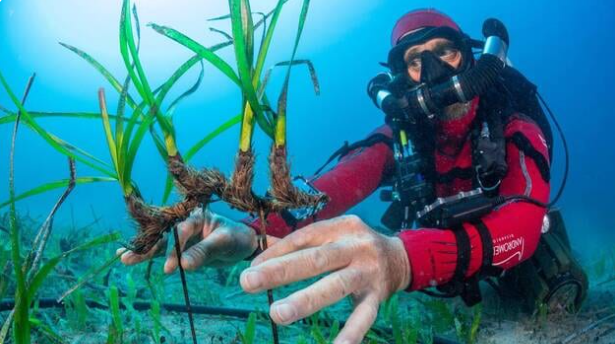Vital for Climate and Biodiversity, Posidonia Seagrass Meadows Are Losing Ground in the Mediterranean. Scientists and Public Stakeholders Are Mobilizing to Protect and Restore Them.
A Delicate Task! This is how Jo-Ann Schies describes her mission between dives. She is a marine biologist at Andromède Océanologie, a company co-founded in Montpellier by diver-photographer Laurent Ballesta. Since 2019, her team has been carrying out meticulous work.
A Delicate Task! This is how Jo-Ann Schies describes her mission between dives. She is a marine biologist at Andromède Océanologie, a company co-founded in Montpellier by diver-photographer Laurent Ballesta. Since 2019, her team has been engaged in meticulous work.
A Habitat for Life and Reproduction
At depths of 20 meters in the Alpes-Maritimes region (Golfe-Juan, Beaulieu-sur-Mer, and Villefranche-sur-Mer), she carefully gathers fragments of torn-up Posidonia seagrass and replants them in the seabed. The goal? To help this precious flowering plant reclaim its lost territory, which has shrunk by 10% over a century in the French Mediterranean, due to boat anchors, coastal developments, bottom trawling, and pollution. Across the Mediterranean, the WWF estimates this loss at 34%.
Similar to terrestrial forests, these seagrass meadows are essential habitats, providing shelter and breeding grounds for 400 plant species and 1,000 animal species. They also serve as irreplaceable carbon sinks, storing three times more CO₂ per square meter than terrestrial forests, along with benefits like water filtration and erosion control. Altogether, Andromède has identified 25 functions for this plant, mapping its evolution in France over the past decade while monitoring coastal water quality alongside the Rhône-Méditerranée-Corse Water Agency.
Source : ouest-france



